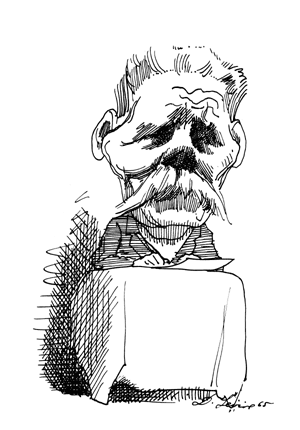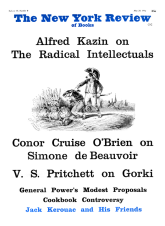From 1898—when he was thirty—until his mysterious death in Stalin’s Russia, Gorki was the most famous, the most embattled of the Russian novelists, both in Russia and in the outside world. He was a symbol of the Russian turmoil, and like all symbols had the strength of being open to many interpretations. It has often been said that in the dreadful revolutionary period between 1917 and 1921, he was in person the only alternative government in the Soviet Union. Lenin saw his importance with the Russian masses and with foreign opinion and gave him pretty well a free hand in rescuing writers and artists of all kinds, works of art, and the historic monuments of the country from the terrible savagery of the mob and the factions: one of Gorki’s devices was to adopt the people he rescued by announcing they were his blood relations—sons, sisters, brothers, and so on—and one can almost say that he became surviving Russia itself.
It is easy to see why. It was not simply a question of his great fame. Gorki himself was a chaos and he contained in himself the conflict of the revolutionary mind: the ardor for remaking a just society in the future and an intense, even reactionary sense of the oldest traditions. Future and past grappled inside him. He was deeply romantic—unlike the leaders of Leninism—an autodidact whose mind had been formed by the folk tales and allegories of his grandmother and who retained to the end a powerful feeling for the tradition of the holy wanderer or vagrant. At the same time he was a petit bourgeois, a déclassé holding a sententious political Sunday School. He saw himself poetically, as the “stormy petrel” who announces with proper frenzy the coming upheaval; also, as the “siskin,” the bird that lures its fellows away by tales of new happiness, and who urges the need of the “lie that ennobles the soul”; but never the objective Leninist “woodpecker.” But which “lie” did he favor? Sometimes it was Lenin’s; then it became the holy wanderer’s. The phases of Gorki’s rhetoric are difficult and, in his writing, they lead to a great deal that is either hysterical or stagnant. The fact is that he is a novelist or playwright of brilliant disturbing beginnings that become rapidly bogged down. He was personally more picturesque and attractive and certainly more touching than most of the great Russian novelists, except Chekhov; but he is far inferior to them as a writer. The man to whom his popular genius is nearest is Leskov; but Leskov is a far greater artist.
Most books on Gorki have compressed his life into its controversies; Mr. Dan Levin’s Life is more spacious and animated. It is rather over-dramatized in style and the writing is very uneven. Anxious to bring Gorki’s day to day life vividly to the large public, he flatters them with vulgarities, as when he talks breezily of Gorki’s “pals” and “gang.” Breeziness was not one of Gorki’s characteristics and nothing one has ever read or heard of Russian literary life has ever suggested a barbecue. But, allowing for these lapses, Mr. Levin has done a very good job. He has cut clear paths into the chaos. He knows the historical and ideological background. He is always vivid and, in his account of Gorki’s academy of “God-builders” on Capri, before the revolution, he has new things to tell. And he is excellent on what is the most interesting relationship of Gorki’s life: the long and complex friendship with Lenin. The “God-builders” come near to splitting the revolutionary movement. The early years of Gorki’s life have no difficulty for the biographer, except the important one that Gorki described and interpreted them far better than anyone else can do. His autobiographies are easily his finest work: even the best of the remainder suffers from artistic earnestness and strain. Like all the Russian writers, Gorki had a marvelous eye for the physical reality that intrudes upon thought and feeling. But where other Russians, even Tolstoy, have only one pair of eyes, Gorki is like a hundred-eyed man who sees dozens of things happening at every blink and who forgets none of them. Sight is a force in Gorki: it was Mirsky who said he saw everything and understood nothing.
It has also been pointed out that Gorki is one of those autobiographers—even in the many self-projections in his novels—who is not himself present. He becomes Russia. He exists as a piece of Nature on which the scene and the people have encamped. This fitted him perfectly to describe the rise of crowds: he was himself a crowd. And yet—and this is the difficulty—he is also nothing of the sort. He himself always resented the suggestion that he was a writer who had risen from the masses. On the contrary, he was the petit bourgeois, the child of small capitalists who were ruined by the new industrialism that had set in during his childhood. He was injured and humiliated by the ruin. His wanderings in childhood and youth are a search for a livelihood. He enormously resented being robbed of education. He read everything, indiscriminately, in the mood of one claiming a right taken from him. As in Dickens, so in Gorki, there is a streak of the prig. He was for long chaste and always a puritan idealist in love. His first mistress found his romantic idealism unendurable and left him. The writer who was the crowd was also really outside.
Advertisement
Mr. Levin skillfully relates the key stories to Gorki’s thinking or, rather, rhetorical life and he follows the political course in lively detail. One gets intimate glimpses of Gorki just before 1905 when Morozov, the millionaire industrialist, became the backer of the revolution. Morozov thought, with the naivety of a big businessman, that he could buy the revolution and run it himself. He was an excellent, mad megalomaniac friend to Gorki and to Chekhov. Mr. Levin quotes conversations from Tikhonov’s recollections, which are suspect and somewhat jazzed up, but which, all the same, catch some grain of plausibility:
“He scurries before the Revolution, like a devil before the dawn,” said Chekhov of Morozov.
“He’s smart and talented, but in politics he’s a hick doctor,” said Morozov of Chekhov.
“Rich merchants always smell like a barber’s shop,” said Chekhov of Morozov. “If he has his way he’ll buy the whole intelligentsia for a play thing.”
But Morozov was shrewd. He saw that Gorki had upgraded his family socially in writing Foma Gordeyev and told him he did not understand the modern capitalist. It was twenty years before Gorki took Morozov’s tip and wrote The Artamazovs. Mr. Levin has an enigmatic sentence about this: Savva Morozov is not portrayed in this book: “He went too deep, within Gorki; he was one of his deep mysterious symbols, quicksilver, not to be contained in what was supposed to be a ‘realistic’ book.” Certainly Morozov was quicksilver, also a man who wanted autocratic power. Was this another Gorki strain, which was to come out at the end of his life when he returned to Russia from Sorrento to found the Union of Soviet Writers and to be the figurehead of social realism? The angry émigrés complained that Gorki, the rich man, had sold out, that fame and wealth had intoxicated him. In this they may have been a little right. In putting his name at the head of socialist realism, Gorki earnestly and even fatuously established an aesthetic disaster. But Gorki was innocent rather than infatuated with either power or money. All his life he gave most of his money carelessly away: to support of poor children, to the support of revolutionary groups, to a whole host of hangers on. He was a chronic founder and financier of groups. He pretty well supported the conspirators on Capri and Sorrento. They crowded his house. He himself lived on next to nothing. And, if one turns back to Mr. Levin’s account of Gorki’s relations with Tolstoy, one can see that the desire to improve on Tolstoy was implanted. (After all, Dostoevsky also longed to have an estate: the desire to be the father of a community seems to have been strong among those who condemned the estate system.) Finally, in Gorki there is the impulse of sheer, simple bookishness. Gorki was probably the last great purely literary writer with the old-fashioned, almost awed respect for books; and he certainly deplored the decay of Soviet literature after the late Twenties. He was simply naive in thinking that Socialist Realism with its official policy and its absurd directives could do anything.
And, in any case, there was the old leaning towards the “lie that ennobles.” Yet that return to Stalin’s Russia is sad. It was bound to be tragic. It was a compulsive return. Like Dostoevsky whom he hated—“the petit bourgeois stinks of goat”—Gorki was allured by extremes. It must have been pleasant to get back to Russia, to believe in the siskin’s beatific future and the decadence of the West. Whether he was in fact murdered by Stalin’s orders neither Mr. Levin nor anyone else can tell us. We shall probably never know.
This Issue
May 20, 1965




